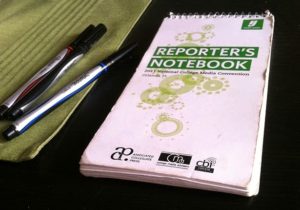My career in print journalism, while providing me with unforgettable experiences and much joy, also provided some angst, heartburn and at times a touch of dread.
Now and again I would encounter situations that compelled me to look more deeply into the affairs of public officials I respected. Such was the case about 30 years ago while I worked as editorial page editor for the Beaumont Enterprise in the Golden Triangle region of Texas.
I went to work one morning and while reading that day’s edition I came across a story about a Jefferson County Commissioners Court meeting. Near the end of the story, we reported that “In other business,” commissioners approved a contract involving the opening of a café in the courthouse that would be run by a state district judge, Larry Gist.
It caught my eye. I took it up with my boss, the executive editor, and inquired about looking further into that matter. It didn’t seem appropriate for a state official to be operating a private business inside a county courthouse.
I’ll give you the Cliff’s Notes version of what I learned.
Judge Gist had prepared a bid to operate the courthouse café with a friend and business partner of his. He communicated with the county auditor, a young man named Jerry Ware, about his interest in running the café. He used what he told me later was “facsimile” county stationery, meaning he paid for the letterhead that would go atop the documents he was submitting for the auditor to consider.
But he signed the documents, “Larry Gist, judge.”
Here is where it got real sticky. Ware was appointed to his office as auditor by the district judges. So he considered a bid by one of his employers, one of the individuals to whom he answered. State law, interestingly, does not require a county to accept the lowest bid on projects such as this; it gives the county discretion to determine the “best bid” offered.
So, Ware — who works for Larry Gist (among other judges) — selected Gist’s bid to operate the café on the ground floor of the Jefferson County Courthouse.
That seemed strange. I thought it smacked of conflict of interest. I talked with Judge Gist, asked him about the stationery and quizzed him about whether he put any undue pressure on the county auditor to look favorably on his bid. I talked to Jerry Ware, and asked him whether he might have been influenced by the facsimile letterhead and the signature that contained the word “judge” alongside the name of the individual who was bidding on the courthouse business.
We published an editorial that questioned whether the county was adhering to all the proper ethical standards by allowing the judge to bid on a project to be housed inside a courthouse where he worked and whether the auditor was applying objective standards to all the bidders who had sought the contract.
Quite obviously, Judge Gist and Jerry Ware were unhappy with the newspaper and with me. Ware hated my guts for the rest of his life. He died of cancer not too many years later.
As for Gist, I learned through other channels that he sought to sue me and the paper for libel. The only sticking point for Gist in his pursuit of a legal challenge was that nothing we published was untrue. As you might know, truth is the first and last line of defense in any libel lawsuit.
Judge Gist and I endured a frosty relationship for the rest of my time on the Gulf Coast. I am happy to say, though, that it thawed over time. I had occasion to talk to Judge Gist on another matter once I made the move from Beaumont to the Texas Panhandle.
I don’t know the status of the courthouse café. That was then. The here and now allows me to look back on that episode with just a touch of relief that it never got past the threat of a lawsuit.
